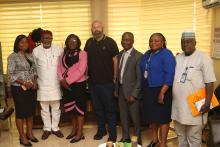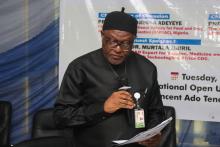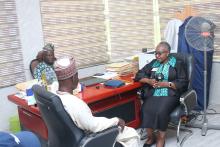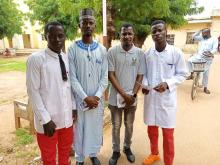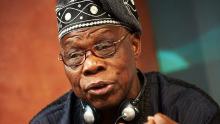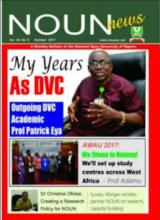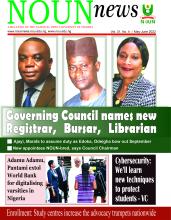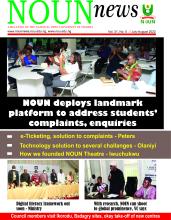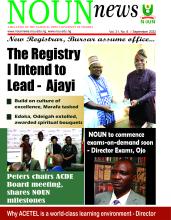
A Public Lecture
Professor Olufemi A. Peters
An Alumnus of the University of Ibadan
1. Protocols
▪ The Special Guest of Honour, H.E. Engr Seyi Makinde, The Executive Governor of Oyo State;
▪ The Chairman of the Occasion, Mr Akin Akinfemiwa, CEO/MD, Geregu Power Plant Plc and Forte Oil;
▪ The Chief Host and Vice-Chancellor, University of Ibadan, Professor Kayode Adebowale, FAS;
▪ The President, University of Ibadan Alumni Association Worldwide, Professor Saawua Gabriel Nyityo;
▪ Distinguished Alumni of the University of Ibadan here present;
▪ Principal Officers of the National Open University of Nigeria (NOUN);
▪ Directors of various Units at the National Open University of Nigeria;
▪ My Abeokuta Grammar School Classmates here present;
▪ Friends of the Alumni Guest Speaker;
▪ Invited Guests;
▪ Ladies and Gentlemen
▪ Good evening.
2. Preamble
I want to appreciate the Global Alumni of the University of Ibadan (UI) who have organised this event and invited me as Guest Speaker of the 2024 Alumni Lecture of the Great University of Ibadan, our alma mater. I feel greatly honoured as I am aware that this university has produced a large coterie of illustrious Alumni since its establishment as a College of the University of London in 1948.
I have two reasons for being here: I had my undergraduate study in UI between 1976 and 1979 reading for the BSc Chemistry Honours in the process. The late Professor Domingo Okorie, FAS was my projectsupervisor. I recall great names such as Father Folley, Professors Beetlestone, Hirst, Ajayi, Bamkole, Okogun, Ogunmola, Okonjo, Adesogan, Adesomoju, Adeleke, Osibanjo and at the time, one young model lecturer of mine, Dr Onyido now Professor of course; reputable
academicians with fantastic and different character traits. My student experience at UI was perhaps basically the same as with others in the University at the time. Academic focus mixed with social interactions, some of which nurtured and expanded my vistas to who I am today. I resided in the Great Kenneth Mellanby Hall, the premier hall of residence, then the best and I believe, still the best undergraduate male hostel.
It was and still is, a great pride that I have a university of Ibadan degree. GREAT UIte.
The second reason I am here is to provide the enabling context for the topic of discourse this evening. Between 2014 and 2018, I was opportune to head the Nigerian Stored Products Research Institute (NSPRI), Ilorin, an agency of the Federal Ministry of Agriculture and Rural Development with the mandate to optimize all types of processes and technologies capable of enhancing the shelf life and health status of all agricultural produce in Nigeria, as well as improving the socio-economic status of producers.
Presently, I am heading the National Open University of Nigeria (NOUN) as Vice- Chancellor. Until the disruptive influence of COVID 19 and emergence of new technologies, the NOUN was alone in operating a distinctly different model of educating Nigerians. With over 150,000 students spread across the length and breadth of this country and beyond, we are easily the largest university in the country. Distinguished audience, it is these aforementioned occupations and attendant experiences that have provided the context for my being here this evening.
With background experience as the head of two academic institutions and being a recipient and implementer of public policies, I am in a fortuitous position to lend a voice to public
discourse on certain policies that have been rolled out to public institutions and especially universities.
There is a caveat that I must lay bare. As a sitting Vice-Chancellor, one may naturally be hesitant to speak on certain issues because of the tendency of the public to conflate personal views with those of the official position that one holds. Then I recalled, that this is still Ibadan, the cradle of intellectual courage where the fear of delving into any issue is unknown. After all, our motto is Recte Sapere Fons – ‘to think straight is the fount of knowledge’. In that spirit, I embarked on a reflection on the topic at hand. Despite the potential risks of critiquing federal policies, society, as academics and administrators
bequeath us the opportunity of shared experiential learning with the objective of improving its fortunes; in this particular case, the fortunes of the university system in Nigeria. Besides, the University has been the bastion of intellectual discourse that stimulates critical thinking, through the analysis of data available for behavioural and attitudinal changes to take place.
3. Introduction
One thing that we can agree on, is that Nigeria's problem is not the absence of beautifully crafted policies, often couched in elegant phrases, laudable intent, ambitious coverage and deep insight. However, the perennial challenge of public policy development and enactment in Nigeria has been the absence of full commitment to follow through with implementation. Indeed, several development plans and policies would have pivoted Nigeria beyond its current developmental milieu, but the failure of implementation follow- through had been their ‘Achilles heels’. Let me quickly point out that the issue of non-implementation of policies is not the trajectory that I intend to pursue in this address. Indeed, the reverse is the case, because Government has demonstrated the determination to follow through the implementation of the policies in discourse today, to its fullest.
The focus of my address is to consider some unintended consequences of certain policies that have been implemented in Nigeria. In examining this topic, I do not intend to examine the full gamut of successive Nigerian government policies. My intention is to consider different policy options that have been advanced in addressing various social issues in
Nigeria, with particular reference to Federal Universities.
Having said this, I wish to add that it is unnecessary to bore this already well-informed audience about the role of government policies in social development. However, it seems to me a convenient point to take off this conversation. As Acemogol and Robinson, authors of ‘Why Nations Fail’ observed in their seminal and influential text, government policies
play crucial roles in shaping the socio-economic landscape of nations, and Nigeria is anexample of a country that attempts to use policies for social engineering in the manner expressed by these writers. They further argued that implementing social policies often yields unintended consequences, which may undermine their intended objectives and have
significant ramifications for the people. Consequently, it is worthy to examine various instances of unintended consequences resulting from government policies in Nigeria across different sectors.
My approach is also to serve two other ancillary purposes: An attempt at a rigorous scholarly analysis of the issues presented here; and secondly, highlight the complexities and challenges inherent in policy formulation and implementation in Nigeria, while also discussing some of the unintended consequences, with the ultimate objective of improving policy outcomes.
4. Who owns The University?
University has its original nomenclative word in the Latin phrase,universitas and refers in general to "a number of persons associated into one body, a society, company, community, guild, corporation etc" with collective legal rights guaranteed by a conferring authority of the society of which it is founded. Their major attribute, as given by the same authority, is their legal instrument which makes them self-regulating and independent with the capacity to award prescribed qualifications. In modern usage, the word has come to mean "an
institution of higher education offering tuition in mainly non-vocational subjects and typically having the power to confer degrees".
Without doubt, the Nigerian University System continues to evolve as an essential component, and indeed one of the key drivers and enablers of the country’s growth and development. Beginning with the establishment of the University College, Ibadan in 1948, it has grown to comprise today, 61 Federal Universities, 63 State Universities and 148 Private Universities including the National Open University of Nigeria, to enable divergent modes of teaching and learning. The Nigerian state gave authority to the National Universities Commission (NUC) to establish and maintain minimum accreditation pre-requisites for universities all over the country.
Beyond these, we might ask the question, who does the university belong to? In answering this question, it is widely acknowledged that Universities are public institutions belonging to the broader society and exist to serve public interests. Therefore, we can safely say that universities belong to a diverse range of stakeholders as numerated
below:
a) Society: Universities are established to serve the needs of society by providing education, conducting research, and contributing to the development of knowledge and skills. As public institutions, universities are accountable to the society they serve.
b) Students: Universities belong to the students who enroll in academic programmes and participate in educational activities. Students are key stakeholders who benefit from the resources, facilities, and opportunities provided by universities.
c) Faculty and Staff: Universities belong to the academic and non-teaching staff who work within the institution to implement academic programmes, conduct research, community services and support its operations.
d) The Community: Universities are part of the broader community in which they are located. They contribute to the social, cultural, and economic development of the community through educational programmes, research projects, outreach activities, and
partnerships with local organisations.
e) Government: In many countries like Nigeria, universities receive funding and oversight from government agencies or ministries responsible for higher education. The government plays a role in regulating and supporting universities to ensure they fulfill
their educational and research mandates.
f) Donors and Partners: Universities often receive support from donors, philanthropic organisations, industry and other partners who contribute financial resources, scholarships, research grants, and other forms of support. These stakeholders have a vested interest in the success and impact of the university.
g) Alumni: Universities also belong to their Alumni, who are graduates of the institution. As Ambassadors for their alma mater, Alumni play significant roles in maintaining connections with the university, supporting initiatives, and contributing to the reputation and legacy of the institution. They play a crucial role in upholding the academic mission of the institution especially when viewed through the prism of their
successes in the professional world.
By serving the interests of these stakeholders and upholding their mission of education, research and community development, universities contribute to the advancement of knowledge, skills, and societal well-being.
5. The Alumni in a University
At this juncture, it seems to me a good idea to consider some of the roles of the Alumni association in the growth and development of universities. Afterall, this is an Alumni lecture and we ought to remind ourselves of some of our roles and responsibilities to our alma mater and the fulfilment we are gathered here today. Alumni play a crucial role in the
progress and development of universities in several ways. These include:
a) Networking and Collaboration: Alumni help to create valuable connections and partnerships with industry professionals, potential employers, and other institutions.This networking can lead to collaborations, research opportunities, and internships for students.
b) Financial Support: Alumni often contribute to the university through donations,grants, and fundraising efforts. This financial support can help fund scholarships, research projects, infrastructure development, and other important initiatives.
c) Mentorship and Guidance: Alumni provides mentorship and guidance to students by sharing their experiences, insights, and knowledge. This mentorship can help students navigate their academic and professional paths more effectively.
d) Recruitment and Advocacy: Alumni serve as ambassadors for the university, promoting its reputation and attracting potential students, faculty, and staff. They can also participate in recruitment events and provide testimonials about their positive experiences at the university.
e) Alumni Engagement and Relations: Alumni involvement in governance can strengthen the relationship between the university and its graduates. By actively engaging alumni in governance processes, the university fosters a sense of community, loyalty, and pride among its graduates.
f) Alumni Representation: Alumni can also serve on the university's Governing Council and Advisory Boards, providing valuable input and perspectives on important decisions related to the institution's governance, policies, and strategic direction.
In a nutshell, alumni support and participation in governance of a university can bring diverse perspectives, expertise, and resources to the decision-making process, contributing to the overall success and advancement of the University. My first thought therefore, as I prepared this lecture was to wonder, how till date, the enabling Act of federal universities have not found it helpful to permit the specific inclusion of Alumni into the senate composition, or indeed the Governing Councils of their universities.
6. Revisiting the Essence of Universities in Society
In recent decades, there has been an unprecedented surge in student enrollment and the number of universities in Nigeria. Indeed, the monumental growth was particularly
noticeable during the administrations of Presidents Goodluck Jonathan (2010-2015) and Muhammadu Buhari (2015 – 2023). These changes have not only been merely an increase in numbers, the whole ecology of university education in Nigeria has been transformed within the last 20 years. Just as the ownership structure has now greatly diversified from the federal government, to state governments, to private ownerships so also is the mode of instruction with my university, NOUN, leading the trail.
Whatever the expansionists' expressions in numbers, Nigerian universities like the universities of the developed world have always been shaped by the Humboldtian ideal. This emphasized the pursuit and transmission of knowledge and its elaboration into Wissenschaft: the professional autonomy of the scholar was essential to this model without any form of influence by the authority that established the university. Put in another way,there has always been an implicit contract between university and society that the distinctive value of higher learning lay in its cultivation of scholarship, science and culture, but which may not have direct bearing on its dialectic relationship with society. The implication of this is that, it entailed granting those who pursued such enquiries, a degree of professional autonomy, a convention made to seem natural by the elite character of the original intents of university education.
Given these notions, universities assume self-governance, and devise different operational tools which in some cases can be contradictory to the prevailing needs of society. It was the highest expression of the gown having nothing to do with the town. But as complexities of society grew, conferring authorities now termed governments, became more involved in the establishment of these ‘universitas’ basking in the intellectual disposition of the products of the universities and their contributions to societies through increasing civilization tendencies. As in other parts of the world, and in a matter of time, the conferring authorities started asking questions from these universities. These include questions of
relevance, applicability, sustainability and democratization e.t.c, in essence, the question of societal, beneficial reciprocity of funding of such institutions. It became inevitable for universities to be increasingly subjected to government policies and public attention and scrutiny.
What however was most profound of these changes was that whilst these questions were being asked, the fundamental character of the constituent components of the university changed rather little. Academic faculty still by and large set the tone of their institutions, demanding unobtrusive peeps into their operations and maintaining the so-called island it wishes to set for itself. Government on the other hand, having now seen that universities can be engines of economic growth and cultural evolutions opined that their activities may
need to be more forcefully aligned with the needs of industry, finance and commerce as the government in power sees it. Here in Nigeria, such realizations came in no distant time as well. Hence the proliferation
of the number of universities established by Government and by other stakeholders. The federal government realised that as in other climes, universities are veritable tools for the realization of the goals of national development; the formation of a critical mass of cultured citizens and the promotion of sustainable solutions to societal challenges. University
education was therefore seen as the most powerful and critical success factor for individuals and the society (Aina, 2007). The issue of peeping into what happens in the ivory tower therefore became imperative. Since the major force behind its existence and sustenance is
funding, which comes from the conferring authority, it means that the University, if it cannot fund itself, may have to lose some of its freedoms, or is it autonomy, to the resource providers.
7. The Challenges facing Universities in Nigeria
Universities in Nigeria face various challenges. The following are some of the key aspects of what is happening across our universities today:
a) Funding Challenges: Nigerian universities often face funding challenges, which can impact infrastructural development, research activities, faculty salaries, and student services. Limited funding from the government and other sources can hinder the growth and quality of education provided in universities.
b) Infrastructure Deficiencies: Many universities in Nigeria face infrastructure deficiencies, including inadequate classroom facilities, laboratories, libraries, and accommodation for students. The lack of sufficient infrastructure can affect the quality of education and research activities in universities.
c) Industrial Actions: Nigerian universities have experienced periodic strikes by different staff unions, such as the Academic Staff Union of Universities (ASUU), Senior Staff Association of Nigerian Universities (SSANU), Non-academic Staff Union (NASU) and so on. The strikes are often related to issues such as salary arrears, funding for universities, infrastructure deficits, improved working conditions, and academic autonomy.
d) Academic Quality: There are concerns about the quality of education and academic standards in Nigerian universities. Critics argue that some universities may struggle to meet international benchmarks in terms of curriculum, teaching methods, research output, and student outcomes.
e) Corruption and Mismanagement: Corruption and mismanagement are pervasive issues in some Nigerian universities, with reports of financial impropriety, academic fraud, and unethical practices. Critics point to instances of nepotism, favoritism, and lack of transparency in university governance.
f) Graduate Employability: There are perceptions that graduates from Nigerian universities lack the necessary skills and competencies required by the job market. Employers and industry stakeholders have expressed concerns about the capability of graduates to meet the demands of the workforce.
g) Examination Misconduct: There are concerns about the prevalence of examination malpractice and academic dishonesty in Nigerian universities. Critics argue that this undermines the credibility of academic qualifications and devalues the education system. The criticisms and unsavoury perceptions of universities in Nigeria reflects the need for reforms, improvements in governance, accountability, and investment in higher education. It is needless saying addressing these challenges can help enhance the quality of education, research output, and reputation of Nigerian universities.
8. What can the Government do?
It is often said that ‘He who pays the piper dictates the tune’. Going back to our context,
the federal government is the conferring authority. Thus, the government expects to
exercise some form of control over what its universities practice. But first, it has to ensure
that its institutions are properly funded. Some of the mechanisms that the government uses
to fund its universities include:
a) Grants: Capital and Recurrent;
b) Periodic Subventions/Allocation; and,
c) Intervention Funds, such as TETFUND, Needs Assessment etc;
Other sources of funding for universities include:
d) Service charges;
e) Internally Generated Revenues - Nigerian federal universities have embraced commercial ventures in response to government’s mandate that each university must generate at least 10 percent of its total revenue. The commercial ventures which are of different kinds include: consultancies, petrol stations, bookshops, publishing houses, schools, hotels etc;
f) Foreign grants from donor agencies like the World Bank, COL, ACU, USAID etc; and,
g) Grants and Endowments from Individuals and Local NGOs such as MTN Foundation, Dangote Foundation and so on.
From the myriad of sources, it may appear from the perspective of government, that the challenge of funding for universities is being adequately addressed. However, one of the major criticisms of universities earlier stated above is Corruption and Mismanagement,
which is believed to be pervasive, with reports of financial impropriety, academic fraud, and unethical practices. Critics also point to instances of nepotism, favoritism, and lack of transparency in university governance.
One of the ways I believe the government sought to address some these issues is to control the money it directly provides to the universities through its statutory disbursement organs. At this juncture, it is worthy to remind ourselves that one of the instruments of control of public finance and governance is the enactment of policies to meet the deserved objectives of Government.
9. An Examination of Some Recent Government Policies
In our recent political history, the Nigerian government has introduced several mouth- watering social policies, including subsidies on fertilizer for agricultural products, the universal basic education policy, the national health insurance scheme and so on.
Within the theme of this discussion, I want to examine two major policies of the government in detail, highlighting the unintended effects of these policies on Federal Universities in Nigeria. Despite the myriad of funding sources available to federal universities, it is clear that there is a problem of underfunding. It is also clear, that this is a consequence of the expansion of the system in response to the growing demand for university education and the intensifying needs of the modern economy driven by knowledge, without a corresponding increase in available resources. Permit me here to think for government. The government had for a long time remained the sole financier of public universities, but due to economic depression and a drop in oil receipts in recent years, the country has experienced budget constraints. Faced with this daunting challenge, Government tries one last card - that of direct control of her supply of funding, and revenue receipts of all its agencies, including the universities.
10.The Treasury Single Account (TSA)
The first policy that I intend to consider is one that is familiar to us all: the Treasury Single Account (TSA). The TSA is a public accounting system that uses a single account or a set of linked accounts by the government to ensure that all receipts and payments are done
through a Consolidated Revenue Account (CRA) at the Central Bank of Nigeria (CBN).The objective of the TSA is to facilitate regular monitoring of government cash balances. It also enables an analysis of government cash flows e.g. identifying causal factors of variances and distinguishing causal factors from random variations in cash balances.
The pilot TSA scheme commenced in 2012 under the Jonathan Administration using a unified structure of accounting for 217 government Ministries, Departments and Agencies (MDAs) for accountability and transparency in public fund management. In 2017, it was extended to the Universities and other tertiary education institutions by the Buhari
administration.
a) The Principles of TSA
Based on the principle of unity of cash and treasury, TSA is designed to check the incidence of multiple accounts operated by government MDAs for collection and spending of government revenues. The purpose being to ensure adequate monitoring of government revenue receipts and expenditures and block leakages, as no MDA is allowed to keep any operational bank account. It also sought to check incidence of idle
cash lying over extended periods in bank accounts held by spending MDAs, while the government continues to borrow to execute its budgets. TSA allows government banking to be unified, to enable the relevant stakeholders such as the Ministry of Finance and Accountant General of the Federation to have full oversight of all cash flows.
To pay money under TSA, depositors make payment to a transit account in a commercial bank and the funds are automatically remitted to the CBN at regular intervals, i.e. at the end of the business day. The TSA scheme covers all MDAs as well as other institutions and parastatals that collect revenues and monies payable to the Federal Government of Nigeria, including all forms of receipts, refunds, operating
surpluses, transfers, donations, over-payments, taxes and customs duties, etc.
b) Objectives of the TSA in Universities
The major intent of implementing a Single Treasury Account (TSA) for universities in Nigeria is to align the funding and expense system of universities with all other federal government agencies. How does it achieve this?
i) It consolidates all Government financial transactions into a single account.
Objective: Enhance Transparency and Accountability.
ii) TSA centralizes all financial resources to help manage finances, track revenue receipts and expenditures, and ensure compliance with financial regulations and guidelines.
Objective: Improve Financial Management. Enhance Efficiency and Effectiveness in managing finances of universities.
iii) TSA reduces financial leakages and instances of fraud because it is centrally controlled and monitoring could be easy.
Objective: Reduce Financial Leakages and Fraud.
iv) TSA provides the necessary data to guide decision making, budget planning and implementation.
Objective: Facilitate Strategic Planning and Budgeting.
v) TSA facilitates the implementation of Government’s Financial Policies for universities to align with the broader government's financial management policies and objectives, promoting consistency and coherence in financial practices across institutions.
Objective: Consistency and coherence in financial practices.
vi) TSA prevents the erstwhile incidence of idle cash from unutilised balances, and reduces the cost and incidence of borrowing to fund institutions, and attendant cases of profiteering at the expense of Government.
Objective: To curtail unnecessary borrowing and profiteering at Government expense.
Viewed within well intentioned desire of the federal government to have all its resources and financial expenditure items within its bird’s eye view, this should be a laudable project. What then are the issues? Maybe we can get this through the challenges encountered during the implementation?
c) Challenges Associated with the TSA in Universities
i) Perceived Loss of Autonomy and Control: Universities in Nigeria are used to managing their finances independently, and the transition to a centralized TSA system has been seen to limit their financial autonomy and control over funds. But has it?
ii) Problems of Compliance and Accountability: Ensuring compliance with TSA guidelines and maintaining accountability in financial transactions can be challenging for universities, because they are not used to it and because they do not have strong financial capability within the system. In addition, the financial reporting systems and nature of services rendered by universities are basically different from Government MDA’s for which the policy was originally designed.
iii) Administrative Burden: The implementation of the TSA system increases administrative burden on universities, to adapt their financial processes and reporting systems to comply with treasury guidelines from the CBN.
iv) Problem of Cash Flow Management: Universities have faced challenges in managing cash flow effectively under the TSA system, because of the consolidation of the funds in a single account and central control of disbursements.
v) Old habits Die Hard: There was intense resistance from university staff and stakeholders who were accustomed to their former financial management systems.
vi) Differing Internal Operation Mechanisms: Most Ministries and governmental agencies do not have similar internal operation mechanisms and risk considerations, such as staff and students’ unrest, like universities.
d) The Unintended Consequences of TSA on Federal Universities
It is inevitable that government policies, such as TSA, will have unintended consequences on federal universities, impacting various aspects of their operations, including academic programmes, and overall functioning. From my vantage positions and implementor, some unintended consequences of the TSA on Federal universities could be found to include:
i) Delay in Access to Funds: Due to the centralized collection of revenues and expenditure approval, bureaucratic bottlenecks often cause delay in the release of funds for activities and projects since all approvals go through a central source.
ii) Erosion of Autonomy and Academic Freedom: Universities tend to view the TSA policy as an infringement on academic freedom, autonomy, or independence. For example, it impacts international collaborations by distorting the flow of receipts and utilisation of grants and endowments.
iii) Central Data Source: Following the implementation of the TSA, universities and MDAs now have a central source of data that is required for decision making and planning. This is an unintended outcome of the TSA, albeit a rather positive one.
iv) Compatibility and Uniformity of Financial Management Systems: Since the implementation of the TSA, there has been a gradual uniformity of financial practices across universities and MDAs. This is another unintended effect of the TSA on universities. It is however uncertain whether it is positive or negative.
v) Capacity Building and Infrastructure Investment: Following the implementation of the TSA, universities have had to invest significantly in the training of their staff to learn how to navigate the TSA system. Universities also had to invest in technological infrastructure for the TSA at their own expense.
11.The Integrated Payroll and Personnel Information System (IPPIS)
The second major policy enactment that has impacted university operations is the Integrated Payroll and Personnel Information System (IPPIS). The IPPIS was introduced by the Federal Government in April 2007, and its management transferred to the Office of the Accountant General of the Federation (OAGF) in October 2008. At inception,
Universities were not included in the list of MDAs enrolled into the IPPIS.
However, in the year 2019, the Federal Government directed that all federal universities personnel be enrolled in the IPPIS. The objectives of the IPPIS are to:
a) provide a centralized database for manpower planning and decision-making;
b) facilitate the automation and storage of personnel records;
c) support the monitoring of staff emolument payments against budget;
d) prevent wastage and leakages by ensuring that staff remuneration is based on factually correct information; and,
e) ensure prompt and direct payment of salaries to employees’ accounts, while making appropriate deductions and remittances of 3rd party payments such as tax, pension, cooperatives, union dues and bank loans.
It is now public information that following the implementation of the IPPIS for universities,university staff unions, especially the Academic Staff Union of Universities (ASUU) highlighted several areas of concerns such as University autonomy, the inflexibility of IPPIS to accommodate the peculiarities of universities among others. However, the Federal
Government maintained that its intentions were to overcome transparency and accountability deficits, indiscriminate proliferation of accounts, abuse of IGR and diverse allegations of corruption that underpin financial operations of some Universities.
Government went on to issue a deadline for academic staff of Nigerian universities to be captured and suspended the salaries of staff that were not captured. Following the impasse
that resulted therefrom, ASUU embarked on an indefinite strike on the 23rd of March 2020. The strike lingered until October 2020 leading to the cancellation of that academic session by some tertiary institutions.
12.The Unintended Consequences of IPPIS on Universities
Having discussed the purposes that underpinned the IPPIS, let us now consider some of the unintended consequences that attended the policy with respect to universities:
a) The difficulties in accommodating the peculiarities of the University System, including data discrepancies and irregularities;
b) The inadequacy of ICT infrastructure as reported by some universities;
c) The perceived challenge of centralization versus autonomy with respect to the implementation of the IPPIS;
d) The challenge of delayed payments and related issues;
e) Inflexibility in the recruitment of staff, regular and short-term, for critical areas of need. For instance, it stopped universities from the usual practice of retaining 1st Class graduates - The Guardian newspaper of Thursday 25th April reported that over 5,000 1st Class graduates of Nigeria’s public universities are languishing in unemployment despite the dire needs of universities for academic staff;
f) It does not allow for timely replacement of academic staff exiting the universities, without recourse to the Office of the Head of Service of the Federation and Ministry of Finance for approval, which may bear extraneous conditions;
g) It has no provision for visiting staff on sabbatical leave, the hallmark of universities world-wide, which allows for free movement of academics on short-term visit for teaching and research;
h) It has no provision for promotion arrears of salaries of different categories of staff (where applicable) in the university system;
i) The core ingredients of university autonomy and academic freedom have been eroded through undue interferences by the implementation of the IPPIS;
j) It did not allow for the deduction of check-off dues for unions and cooperative societies of universities;
k) It did not allow for the creation of departmental accounts and in some cases Journal and Laboratory accounts, which led to the payment of public funds for departmental activities and projects into personal accounts;
l) The release of personnel emolument on a month-by-month basis impinges on the capacity of universities to plan ahead for human resources required for quality training of students and research; and,
m) The migration of Universities and Inter-University Centres from GIFMIS to IPPIS in
2020 distorted the regular payment of salaries, allowances, emoluments and 3rd party deductions.
13.Public Policy and Perception of Implementers and Recipients
The major question one should ask is: if these policies were meant for public good, why the resistance by the people it was meant to serve? I think the issue was that whilst the government meant well for the overall benefit of society and good governance, the recipients focused on their own peculiarities and the custom of doing things their ways.
Public policies are often subjected to perceptions of the implementers, including government officials, administrators, and frontline workers responsible for carrying out the
directives. Similarly, public policies can be influenced by the manner in which the recipients such as citizens, communities, and stakeholders view them. The perception of both parties inevitably plays crucial roles in the success and effectiveness of policy implementation. The perceptions of implementers can have a significant impact on the success or failure of policy implementation. Similarly, the way policies are perceived by
the recipients can influence their acceptance, compliance and intended outcomes.
Here are some key points regarding public policy and their perception by the implementers and recipients:
a) Attitudes and beliefs: The attitudes and beliefs of implementers towards a policy shape their willingness to effectively carry out the policy objectives. Positive perceptions such as support for the policy goals and belief in its importance can enhance implementation
efforts.
b) Capacity and resources: Implementers' perceptions of their own capacity and the resources available to often can influence their ability to effectively implement public policies. Lack of resources or training may lead to challenges in implementing policies successfully.
c) Organisational culture: The organizational culture within government agencies or departments sometimes impacts the perceptions of implementers towards policy implementation. A supportive and collaborative work environment can foster positive
attitudes towards implementing policies.
d) Communication and engagement: Effective communication and engagement with implementers are essential for ensuring their understanding of policy objectives, roles, and responsibilities, to align their perceptions with policy goals. Providing feedback mechanisms and opportunities for learning and improvement can address implementers' concerns and challenges during policy implementation, while continuous feedback loops enable adjustments to implementation strategies.
e) Leadership and motivation: Implementers' perceptions of incentives and rewards for successful policy implementation influences their motivation and commitment to achieving outcomes. Recognizing and rewarding implementers' efforts can enhance their engagement. Strong leadership and support from policymakers and senior officials can influence the perception and motivation of implementers, overcome barriers and create a conducive environment for effective implementation.
f) Understanding and awareness: Recipients' perception of public policy is influenced by their level of understanding and awareness of the objectives, rationale, and implications. Providing clear and transparent communication as well as opportunities for feedback and engagement can address recipients' concerns and improve their perception of policies.
g) Trust and credibility: The level of trust and credibility in government institutions and policymakers impacts how policies are perceived by recipients. Building trust through transparency, accountability, and responsiveness can enhance recipients' confidence in policy decisions.
h) Relevance and responsiveness: Recipients' perception of a policy is influenced by the degree to which it addresses their needs, concerns, and priorities. Policies that are perceived as relevant and responsive to recipients' needs are more likely to be accepted and supported. Policies that are perceived as fair, just, and equitable in their distribution
of benefits and burdens are more likely to gain support.
i) Participation and engagement: Involving recipients in the policy-making process and seeking their input and feedback can enhance their perception of policies. Meaningful participation and engagement can increase recipients' ownership and promote buy-in.
j) Implementation and outcomes: Recipients' perception of policies is shaped by the actual implementation and outcomes. If policies are effectively implemented and lead to positive outcomes, recipients are more likely to view them favourably.
From the foregoing, it is evident that, understanding and addressing implementers' concerns, organizational and leadership support are essential for overcoming implementation challenges and achieving desired policy outcomes. Similarly, understanding and addressing recipients' perceptions, needs, and feedback are essential for
designing and implementing policies that are responsive, effective, and widely supported by the public.
14.Post- IPPIS Implementation Developments and Government Responses
At this point, one might be tempted to assume that the government has been insensitive to the concerns raised by different sectors of the university system.
However, a careful examination of developments since the implementation of the IPPIS policy shows that the government has become sensitive and responsive to the concerns of
the university system. This is exemplified by the following policy directions:
a) The IPPIS now allows for the deduction of check-off dues to unions and cooperative societies;
b) Payment of staff on sabbatical appointments have commenced on the platform;
c) The issues of omission/non-payment and underpayment of some staff have been resolved;
d) The initial problem relating to payment of salaries to the dead, the retired lecturers as well as those who already resigned from their jobs have been solved; and,
e) Most recently, the government has directed that universities be excluded from the IPPIS.
15.Recommendations for Addressing the Unintended Consequences of the TSA and IPPIS on Universities
Without a shadow of doubt, the unintended consequences of government policies of TSA and IPPIS have had significant impacts on staff, students, the university system and the
society as a whole. Addressing the unintended consequences is crucial to ensuring that the policies effectively support the goal of providing quality education for all.
Let us now consider some recommendations for addressing the unintended consequences of government policies on university education Nigeria:
a) Regular monitoring and evaluation: Implementing mechanisms for monitoring and evaluating the impact of government policies can help identify unintended consequences early. This allows policymakers to make timely adjustments and mitigate negative effects.
b) Stakeholder engagement: Involving university staff, students, parents, regulatory agencies and other stakeholders in the policy-making process can provide valuable insights into potential, unintended consequences. Their input can assist policymakers to anticipate challenges and design more effective policies. Similarly, collaboration between government agencies, universities, and other stakeholders can address unintended consequences more effectively. Coordination ensures that policies are implemented cohesively and that resources are utilised efficiently.
c) Flexibility and adaptability: Building flexibility into education policies allows for adjustments to be made in response to unexpected outcomes. Policymakers should be willing to adapt policies based on feedback and changing circumstances.
d) Data-driven decision-making: Utilising data and evidence to inform policy decisions will help to identify trends, patterns, and unintended consequences. Data analytics can provide insights into the effectiveness of policies and highlight areas for improvement.
e) Transparency and communication: Maintaining transparency in the policy-making process and communicating openly with stakeholders can build trust and facilitate discussions about unintended consequences. Clear communication helps ensure that all parties are informed and engaged in addressing issues.
By incorporating these strategies into the policy-making process, government officials can proactively address the unintended consequences of policies and work towards improving the overall quality and effectiveness of the University system.
16.Can one cap fit all?
The phrase, "one size fits all" or "one cap fits all" is often used to describe a solution or approach that is believed to be universally applicable or suitable for all situations or contexts. While there may be instances where a standardised or general solution can be effective, it is important to recognise that not all problems or challenges can be addressed with a one-size-fits-all approach. One of the reasons for this, is the diverse needs and contexts requiring tailored or customised solutions. A standardised approach may not effectively address the specific requirements of diverse stakeholders. Many problems and
challenges are complex and multifaceted, with varying factors and variables influencing the outcomes. Circumstances and environments are constantly changing, requiring solutions that are flexible and adaptable to evolving conditions. A rigid one-size-fits-all approach may lack the agility to respond to changing dynamics and emerging challenges.
17.Conclusion
As I round up this address, I hope it is clear from the analysis above that Government policies often have altruistic and progressive objectives, even if they are unclear at the initial stages. I dare say that there is no government policy that is deliberately anti-people.
However, the timing and process of implementation and the attitude of implementers and recipients are often not properly aligned, leading to conflicts, unintended perceptions and undesired outcomes. Critical engagements are therefore required from different actors in the policy processes.
On the one hand, government policy makers and implementers need to institute robust stakeholder engagement, collaboration and advocacy. On the other hand, we in the university community and the rest of society who are recipients need to approach
government policies with a little less skepticism and an abundance of patience. The government has started introducing mitigation strategies for ameliorating the unplanned and unintended consequences of some of its policies on the University system. This is evidence of an adaptive governance strategy which takes into account the unintended
outcomes and makes concerted efforts to avoid them subsequently.
Which reminds about the story about three acquaintances, the bird, the vine and the tortoise.
The bird, the vine, and the tortoise were close companions long ago in the world of the animals. The three lived in the same tree together. The Tortoise lived at the base of the tree. The Vine grew around the trunk and the Bird dwelt on the branches.
The bird, who thought she was quite attractive and talented, enjoyed singing loudly from the top of the tree as a form of display. She desired her music to reach everyone, but which sometimes disrupted the tranquility of the forest, disturbing other creatures seeking peace.
Nevertheless, she enjoyed the attention,especially from the male birds.
The vine was selfish, careless and lazy. Of the three pals, she remained still on the tree trunk the entire time. The vine will remain in the same location for many years come rain come sunshine. Her response to every request for assistance was that she COULDN'T BE
BOTHERED to help. The tortoise we all know her, was a timid, wise and amiable creature.
The bird would occasionally fly down to join her at the base of the tree, where they would converse and share tales. The tortoise would occasionally beg the vine to instruct the bird
to lower her voice when it sung loudly so that the hunters wouldn't hear her or try to find her. However, the vine frequently retorted saying, "I can't be bothered."
The tortoise also advised the bird anytime she flew down to chat. The bird promised to, but never changed.
One warm afternoon, the bird sang loudly. Unconcerned, she ignored the tortoise's pleas to lower her voice. The vine as usual showed no interest and slept heartily.
A wandering hunter, upon hearing the bird's distant song, stealthily followed the sound until he spotted the bird perched on a tree. He promptly shot the singing bird, who fell to
the ground, near where the old tortoise resided. What did the tortoise do? she withdrew into her shell, hoping to remain unnoticed. However, as the hunter stooped to retrieve the bird,he spotted the tortoise and captured her too.
Since the hunter lacked a bag large enough, he observed the vine wrapped around the tree trunk. Using his knife, he cut the vine and used it to bind both the bird and the tortoise together. The hunter joyfully whistled the very melody he had heard the bird singing as
he journeyed back home. The vine cried tears of remorse. Her statement, "I can't be bothered," had ultimately led to their demise.
This story could be poignant to us as Alumni of the many tertiary institutions in the country. It is indicative that we in this community of scholars also have a role to play. This is where this type of forum is very important to public social discourse. Alumni live in both worlds
and are not operationally encumbered in both worlds. The Alumni is a bridge between the past and the present, connecting and shaping the future. It is therefore imperative for policymakers, researchers and civil society, including the Alumni, to collaborate in addressing the unintended consequences of government policies.
Thank you for listening.
Olufemi A. Peters
Vice-Chancellor
National Open University of Nigeria
- Log in to post comments
- 294 views



